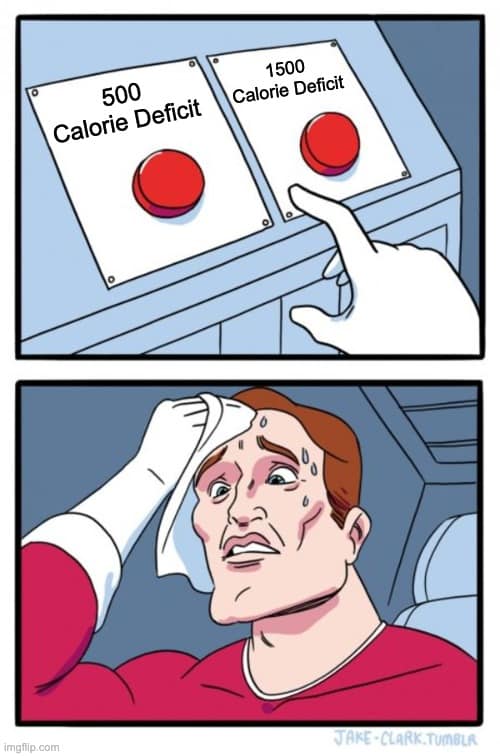- How Much Weight Can You Realistically Lose in 3 Months? - January 14, 2024
- How To Lose 1kg a Week (Guaranteed) - August 20, 2023
- How To Count Calories (or Estimate) and Stay on Track When Eating Out at Restaurants - July 25, 2023
I know, you want to lose weight as quickly as possible.
We all do.
Life would be so much easier if we could get the job we wanted straight after leaving uni, get everywhere you wanted to go in 10 minutes and get the body you want by dieting for a week.
Unfortunately, life and weight loss don’t really work that.
There is definitely a way to speed up weight loss, but it will involve making several sacrifices you’d probably rather not make.
SOMETHING TO CLARIFY
Before we get going, it’s important to note here that we are talking about a 1,500 deficit.
That is NOT the same as a 1,500 diet.
A 1,500 calorie diet means eating 1,500 calories per day (which in fairness, is enough for most people to at least start losing weight at a respectable rate).
A 1,500 calorie deficit means eating 1,500 FEWER than you use every day.
There’s a big difference.
If you want to create a 1,500 calorie deficit then you need to know, or at least have an awareness of how many calories you use every day.
Speak to your weight loss coach to help you work this out.
KNOW YOUR NUMBERS
To create a 1,500 calorie deficit, first, you need to roughly how many calories you use each day. If you use any less than 2,500 calories per day, that means you’ll need to eat FEWER than 1,000 calories per day to create a 1,500 defcit, and that’s just not practical for most people.
HOW FAST WEIGHT LOSS WORKS
In order to lose weight, you need to create a calorie deficit.
The means eating fewer calories than you use on a daily, over a long period of time.
For example, if you use 2,500 calories a day (on average), and you eat 2,000 calories a day (on average), you’ll lose weight.
If you do this consistently, you’ll lose weight at a rate of 1lb (0.5kg) per week.
Not bad.
But here’s the kicker, you can lose weight faster than that. Quite a lot faster.
Below, you can see how much weight you’d per week and per month at different levels of calorie deficit
| CALORIE DEFICIT | WEIGHT LOSS PER WEEK | WEIGHT LOSS PER MONTH |
| 250 | 0.25kg | 1kg |
| 500 | 0.5kg | 2kg |
| 750 | 0.75kg | 3kg |
| 1000 | 1kg | 4kg |
| 1500 | 1.5kg | 6kg |
The bigger the calorie deficit you create, the faster you’ll lose weight.
The downside is, the bigger the deficit, the harder it’ll be to maintain it, for the vast majority of people, the best strategy for sustainable weight loss, is to diet on as many calories as possible.
This means you’ll get results, but you suffer as little as possible and be able to maintain your lifestyle, making as few compromises as possible.
WANT IN TO MY FREE 14-DAY FAT LOSS COURSE? PUT YOUR NAME AND EMAIL ADDRESS IN BELOW;
HOW MUCH WEIGHT WILL YOU LOSE ON A 1,500 CALORIE DEFICIT?
The amount of weight you’ll lose on a 1,500 calorie deficit really depends on a few different factors;
- Your current weight
- Your height
- Your gender
- Your age
- Your activity levels
All of these things combine to determine your total daily energy expenditure (TDEE); this is the number of calories you’ll use each day (on average).
So, here’s how many calories you’d need to eat each day (on average) to achieve a 1,500 calorie deficit;
| TDEE | REQUIRED CALORIE INTAKE |
| 2000 | 500 |
| 2500 | 1000 |
| 3000 | 1500 |
| 3500 | 2000 |
| 4000 | 2500 |
| 4500 | 3000 |
As you can see, the kind of calorie intakes most people would need to hit to achieve that 1,500 deficit are extreme.
The average person probably has a TDEE of around 2,000-,2500 per day, which would mean eating between 500-1,000 calories per day.
That is REALLY low, and most regular people would NOT be able to maintain that for any length of time.
But let’s just say you could.
We already know that you could lose around 1.5kg (3lbs) per week on a 1,500 calorie deficit, but what would that look like based on your current weight?
| CURRENT WEIGHT | WEIGHT AFTER 1 MONTH | WEIGHT AFTER 2 MONTHS | WEIGHT AFTER 3 MONTHS |
| 100Kg | 94kg | 88kg | 82kg |
| 90Kg | 84kg | 78kg | 72kg |
| 80Kg | 74kg | 68kg | 62kg |
| 70Kg | 64kg | 58kg | 52kg |
| 60Kg | 54kg | 48kg | 42kg |
These numbers look great, but a 1,500 calorie deficit per day is going realistically going to be viable for people that weigh over 90kg.
WILL A 1,500 CALORIE DEFICIT PUT YOU IN STARVATION MODE?
No.
Starvation mode is a myth.
You won’t suddenly stop losing weight by eating ‘too few’ calories. As long as you’re in a deficit, you WILL lose weight.
BUT
Metabolic adaptation IS a thing. That means, as you get lighter your metabolism will decrease, so the number of calories you need to eat to lose weight will also come down.
That might mean that, at 90kg you can lose weight by eating 2,500 calories, but at 80kg, you might need to eat 2,000 calories to lose weight.
How the hell do you keep track of this?
Well, the best thing to do is work with a weight loss coach who can monitor your progress each week and tell you exactly when you might need to drop your calories or increase your activity.
WHAT DOES THE SCIENCE SAY?
The consensus about maximum calorie deficits within the science community roughly lines up with what I’ve suggested here.
This meta analysis suggests that “deficits of 500–750 calories per day have been used for weight loss and are recommended by many obesity societies and guidelines”
This study agrees, suggesting that “Conventional hypocaloric diets typically aim at reducing daily energy intake by 500–750 kcal. This energy restriction is usually achieved by diets of 1200–1500 kcal/d for females and 1500–1800 kcal/d for males”
For most people, a 500 calorie deficit is going to provide the right balance between speed of results and sustainability. For me a 1,000 calorie deficit is probably the highest I’d recommend anyone going.
That would result in a loss of around 1kg (2lb), but even the most dedicated and motivated dieters would struggle to to maintain that week after week for several months.
For this reason, I always tend to err on the side of more conservative deficits.
SUMMARY
While a 1,500 calorie deficit sounds great in theory for most people, it’s simply going to be too much.
That’s not to say that there aren’t some people it could work for, for example;
- Very heavy people
- People with lots of muscle
- Very active people
- People that have no commitments, and lost of time on their hands to fully focus on their diet
- Professional sports people that need to make a specific weight by a specific date
Average people do not generally fall into one of these categories, so I don’t advise a deficit as big as 1,500 calories.
For most people, a modest deficit somewhere between 250-750 calories per week will be about right.


Leave a Reply